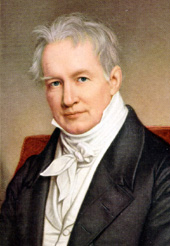 |
| Alexander von Humboldt |
That exhibit and catalog (which was on the 2014 shortlist of five catalogs in the Alice competition of the Furthermore grants in publishing program of the J.M. Kaplan Fund for best catalog of the year) were major investments for the small Americas Society and deserve better recognition. There is a line that appears to have been crossed between fair use and predatory use of the intellectual efforts of other people. The bigger the publisher, the bigger the responsibility.
The two books that Rich reviews are The Invention of Nature: Alexander von Humboldt's New World (Knopf) by Andrea Wulf and After Nature: A Politics for the Anthropocene (Harvard) by Jedediah Purdy.
Wulf traveled in Humboldt's footsteps across Latin America. She shows how he was welcomed in the United States at the highest level (President Jefferson at the White House) to report his findings. From the United States, Humboldt went to Paris, where he was lionized by everyone except Napoleon, whose attempts to popularize scientific discoveries were lame by comparison.
Humboldt is credited with inventing the concept of the "web of life" and the interaction of everything in nature. This is a big departure from the Aristotelian idea in vogue still in the early 18th century that nature made all things "for the sake of man."
Humboldt was the first to make the connection between colonial exploitation and ecological devastation. He became an ardent abolitionist, although he never confronted Jefferson on this topic.
Darwin was slavishly devoted to Humboldt and credits him in no uncertain terms with his inspiration to travel in search of evidence of "the gradual transformation of species". The last paragraph of The Origin of Species is lifted nearly word for word from Humboldt.
Humboldt's followers included Thoreau, Muir and Carson in the United States, and also Whitman, Aldous Huxley and Ezra Pound. In England, William Wordsworth and Samuel Coleridge. In Germany, his friend Goethe.
The second book, by Purdy, is more ambitious and seeks to find a political system that would be more compatible with sustaining the global economy. Theodore Roosevelt and Gifford Pinchot, the first head of the U.S. Forest Service and then Governor of Pennsylvania, tried to be practical in reconciling the ecology with extraction of resources. But when push came to shove, the extractors won. The pattern seems to be continuing with the Keystone Pipeline, the EPA guidelines for methane and CO2, and Arctic drilling.
Purdy says we have to reimagine the future. In the meantime, he says, "the original Humboldt will do fine."

No comments:
Post a Comment